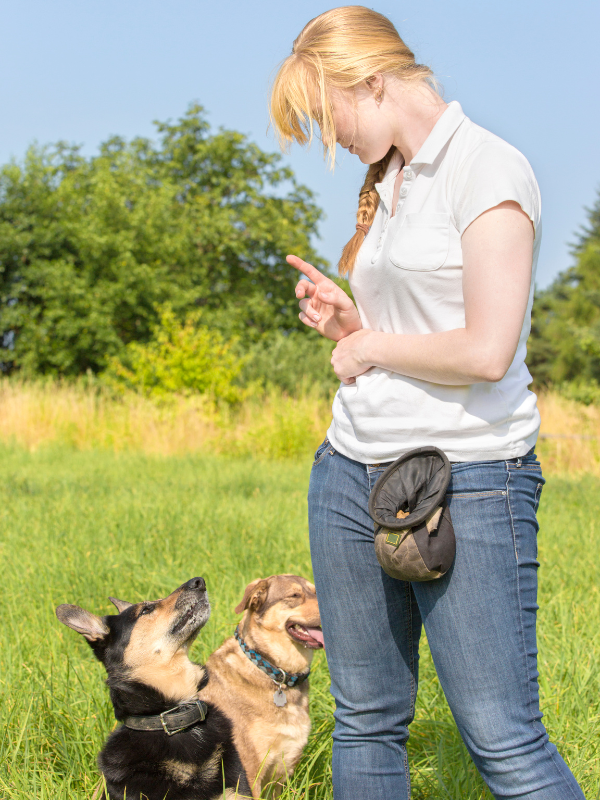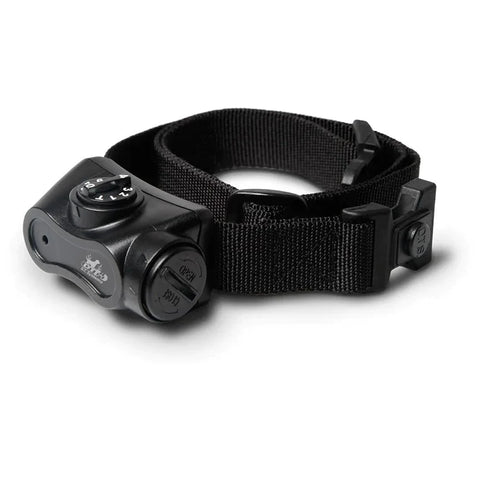737-215-3211

How to Stop Dog Barking: Your Comprehensive Guide
If you've ever been awakened in the wee hours of the morning by your dog's barking or found yourself embarrassed by your pet's vocal expressions in the park, you know the frustration it can cause. And you're not alone in your search for answers on how to stop dog barking.
Dog owners everywhere grapple with this problem. But fret not, because our comprehensive guide is here to lend you a helping hand. By understanding why dogs bark and how to address it, you can start on the path towards a quieter and happier home.
Understanding Why Dogs Bark
The Nature of the Bark
The first step towards understanding how to stop dog barking is to decipher what's behind those vocal expressions. Think of it as cracking a code – each bark has a meaning, and understanding them can be a game-changer in your pet management strategy.
Common Reasons Dogs Bark
Knowing the common reasons why dogs bark can give you a clue as to what your dog is trying to communicate. Some dogs bark when they're bored or lonely, while others bark in response to potential threats or excitement. It's important to identify these triggers to address them appropriately.
Techniques on How to Stop Dog Barking
Training the Quiet Command
Training is the backbone of how to stop dog barking. Teaching your dog the 'Quiet' command can be a powerful tool in managing their vocal tendencies.
Using Distractions
Like humans, dogs can be easily distracted. Using distractions is an effective way to divert your dog's attention from potential barking triggers.
When to Seek Professional Help
Signs You Might Need Professional Help
Persistent, uncontrolled barking can sometimes be a sign of deeper issues that require professional help. Know the signs so you can take the necessary steps.
How a Professional Can Help
In-Depth Behavior Analysis
Professional dog trainers and animal behaviorists have the skills and experience to perform a comprehensive analysis of your dog's behavior. They can help identify the root causes of excessive barking, which might be hard for an untrained eye to catch. This detailed understanding is crucial for developing an effective strategy to control barking.
Personalized Training Plan
Every dog is unique, and so are their reasons for excessive barking. Professionals can create a personalized training plan that caters specifically to your dog's needs. They consider factors such as your dog's breed, age, personality, and the specific triggers causing the barking, ensuring a tailored approach that increases the chances of success.
Hands-on Training Assistance
Implementing training strategies can be tricky, especially if you're new to it. A professional can provide hands-on assistance, demonstrating the right techniques and guiding you through the process. This can significantly improve the effectiveness of the training and help you see results faster.
Continuous Support and Monitoring
Professional assistance isn't a one-time thing. Dog trainers and behaviorists often provide continuous support, monitoring your dog's progress and making necessary adjustments to the training plan. This ongoing support can be a game-changer in controlling your dog's barking in the long term.
Helpful Tools and Resources
Professionals have access to a variety of tools and resources that can aid in bark control. These might include specialized training equipment, informative resources, or connections to a network of other professionals such as vets and dog care experts.
When it comes to figuring out how to stop dog barking, seeking professional help can be a wise move. It offers the advantage of expert insights, practical support, and ongoing assistance, making your journey towards a quieter home smoother and more manageable.
Tools to Aid in Bark Control
Using Bark Collars
Bark collars are a controversial yet popular tool in managing dog barking. Explore how these devices work and whether they're the right choice for your pet.
When to Use a Bark Collar
Bark collars should only be used after other training methods have been tried without success. It's also essential to make sure that the barking isn't being caused by fear, anxiety, or some other serious issue that should be addressed differently.
The Ethics of Using Bark Collars
The use of bark collars, especially those that use static shocks, is controversial. Critics argue that they can cause distress and fear in dogs, and that other methods of training are more humane and just as effective. Supporters, on the other hand, maintain that when used correctly, they can be a useful training aid and are no more cruel than other methods of dog training. It's a decision that each dog owner must make for themselves, ideally in consultation with a veterinarian or a professional dog trainer.
Alternative Bark Control Tools
Not all dog owners are comfortable using bark collars, and that's perfectly okay. There are various other options that can provide a gentler approach to bark control.
Ultrasonic Devices
One such alternative is the use of ultrasonic devices. These tools emit a high-frequency sound when your dog barks. The sound is inaudible to humans, but dogs find it unpleasant. As a result, your furry friend will associate barking with this uncomfortable noise and will be deterred from unnecessary barking. Over time, this can lead to less barking even when the device isn't active.
Citronella Spray Collars
Citronella spray collars work on a similar principle. Instead of a sound, they emit a harmless but strong-smelling citronella mist whenever your dog barks. Dogs generally find this smell unpleasant, making the collar an effective deterrent for excessive barking.
Training Aids
Beyond devices, there are training aids you can use to help curb your dog's barking. These may include clickers, treats, and toys, used in conjunction with positive reinforcement methods. The key here is to reward your dog when they stop barking on command, reinforcing the good behavior.
Mental Stimulation Toys
Sometimes, dogs bark out of boredom. In such cases, mental stimulation toys can be a godsend. These toys, such as puzzle toys filled with treats, can keep your dog occupied and mentally engaged, reducing the likelihood of nuisance barking.
Remember, while these tools can assist, they should not replace a comprehensive training plan and lifestyle adjustments. The secret to how to stop dog barking lies in a holistic approach, encompassing training, environment, and sometimes, the assistance of these tools.
Creating a Dog-Friendly Environment
Your Home Environment Matters
The environment in which your dog lives has a significant impact on its behavior, including its tendency to bark. The old adage, "happy home, happy dog" holds more truth than you may think. In this section, we'll delve into some key aspects of a dog-friendly environment and how they contribute to solving the puzzle of how to stop dog barking.
Space Considerations
First and foremost, does your dog have enough room to move around? Dogs, especially larger breeds, require adequate space for movement and exercise. If a dog feels cramped or confined, it may express its discomfort through excessive barking. By ensuring your dog has a safe and spacious area to stretch its legs, you can significantly decrease the likelihood of stress-induced barking.
Minimizing Noise Pollution
Just like us, dogs can get irritated by constant noise. If you live in a noisy neighborhood, your dog may respond to these disturbances by barking. Consider investing in soundproofing solutions, such as insulated curtains or even white noise machines, which can help minimize external noise and reduce your dog's reactions to it.
Providing Comfortable Quarters
Another critical aspect to consider is your dog's comfort. A comfortable dog bed, access to fresh water, and a well-maintained temperature can go a long way towards making your dog feel at ease. Remember, a relaxed and content dog is less likely to resort to excessive barking.
Toys and Entertainment
Boredom can be a big trigger for dogs to bark. Ensuring your dog has plenty of toys to play with can keep it entertained and less likely to bark out of boredom. Interactive toys, such as puzzles and treat-dispensing toys, can be particularly useful for keeping your dog mentally stimulated and engaged.
Safe Spaces
Lastly, every dog should have a 'safe space' they can retreat to when they're feeling anxious or overwhelmed. This could be a particular room, a crate, or a dog bed. When your dog has a place they associate with safety and comfort, it can greatly reduce anxiety-induced barking.
By taking the time to create a dog-friendly environment at home, you can make significant strides in your quest to stop dog barking. Remember, a happy and comfortable dog is a quiet dog!
The Importance of Routine
Routine is comforting for dogs. Maintaining a consistent daily schedule can help manage barking issues.
FAQs
1. Why does my dog keep barking at night? Night-time barking can be due to various reasons, such as fear, loneliness, or disturbances in the environment.
2. What are some signs that I might need professional help with my dog's barking? Signs may include extreme anxiety, aggression, or uncontrollable barking despite trying different strategies.
3. How long does it take to train a dog not to bark? The duration varies greatly depending on the dog and the specific situation. Generally, consistent training over a few weeks can show positive results.
4. Are bark collars safe to use? Most bark collars are safe when used correctly, but they should not be the first line of action. It's always best to consult with a professional before choosing this option.
5. Can I train an older dog not to bark? Yes, with consistent training and patience, even older dogs can learn to control their barking.
6. How important is a routine in controlling dog barking? A routine provides a sense of security and can greatly help reduce anxiety-related barking in dogs.
Conclusion
Understanding how to stop dog barking is no easy feat, but with patience, understanding, and the right strategies, it is certainly achievable. Here's to a quieter home and a happier dog!





Leave a comment